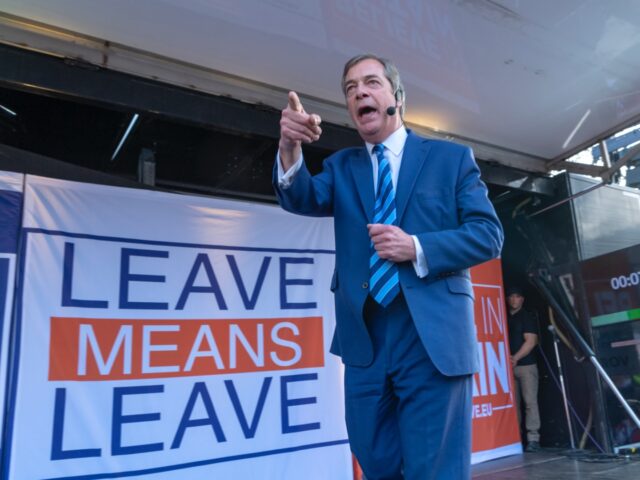Brexit leader Nigel Farage said that Prime Minister Rishi Sunak’s deal with the European Union over the issue of Northern Ireland “doesn’t cut the mustard”, warning that he fears the ultimate authority over disputes will lay in the hands of the European Court of Justice (ECJ) in Strasbourg rather than the parliament in Stormont.
Following years of dissatisfaction over the Northern Ireland Protocol signed by Boris Johnson, though essentially negotiated by his predecessor Theresa May, Prime Minister Rishi Sunak announced on Monday that the Conservative government had finally come to an agreement with the European Union on the matter. Under the protocol, the EU was given effective control over trade between Northern Ireland and the rest of the UK with the imposition of a trade barrier in the Irish Sea.
This left many British loyalists within Northern Ireland feeling betrayed by Westminster as they were subject to often disproportionately over-enforced checks by the EU, which some have suggested were an intentional ploy to disrupt Brexit.
The new ‘Windsor Framework‘ agreed to by Sunak and EU Commission President Ursula von der Leyen on Monday sets out so-called red and green lanes, with trade between Great Britain and Northern Ireland being put on the green lane with minimal checks and goods traded with the Republic of Ireland being put on the red lane for EU single market checks.
While Sunak’s deal made concessions to the EU on issues of taxation and state aid, Brexiteers, such as Nigel Farage have warned that the key issue will likely be that of sovereignty, and the potential role of the European Court of Justice (ECJ) as acting as the final arbiter of disputes.
“For me, that’s why this so-called deal doesn’t cut the mustard. We await the legal texts which will come out over the course of the next few days,” Farage said.
Mr Farage said that the real blame for the current situation lay at the feet of former Prime Minister Theresa May and her then-top negotiator Olly Robbins for being tricked by Eurocrat Guy Verhofstad and others who “deliberately used Northern Ireland to trap the British negotiators. They did it brilliantly and we’re living with the consequences.”
'Clearly, if the EU's court in Strasbourg still has the final say, then Northern Ireland simply hasn't got Brexit in any recognisable way… This so-called deal doesn't cut the mustard.'@Nigel_Farage asks whether the Windsor Framework is really a win for UK sovereignty. pic.twitter.com/DvSGuZcg5A
— GB News (@GBNEWS) February 27, 2023
The deal laid out a so-called “Stormont Break” in which legislators in the devolved (local) parliament in NI will be able to veto EU rules should 30 of the 90 lawmakers in Northern Ireland from two parties agree that they would impede upon normal life in the region. However, at present, it is unclear as to whom they would have to make such a case, be it the government in Westminster or the EU itself.
Others have also warned that the deal may continue to empower the EU’s supreme court, including German Member of European Parliament (MEP) Gunnar Beck, who told Breitbart London on Monday evening: “The Commission and the European Parliament seem willing and ready to retaliate if the UK ‘dares’ to trigger the Stormont Break,” adding that by his reading of the agreement, the European Court of Justice “remains the sole and final arbiter for EU rules, even in Northern Ireland.”
This will likely serve as a sticking point for the pro-Brexit Democratic Unionist Party (DUP), the main British Unionist party in Northern Ireland, which has so far refused to form a government in Stormont over the issue of the Northern Ireland Protocol.
While it seems at first glance that the party is willing to back Sunak’s deal, DUP leader Jeffrey Donaldson said on Tuesday that his party won’t be “rushed or pushed” into a hasty decision on giving their ascent to the Windsor Framework.
Tories Claim Yet Again That Brexit Is 'Done' as Dubious Northern Ireland Deal Struck https://t.co/VIgLFn768U
— Breitbart London (@BreitbartLondon) February 27, 2023
Follow Kurt Zindulka on Twitter here @KurtZindulka

COMMENTS
Please let us know if you're having issues with commenting.